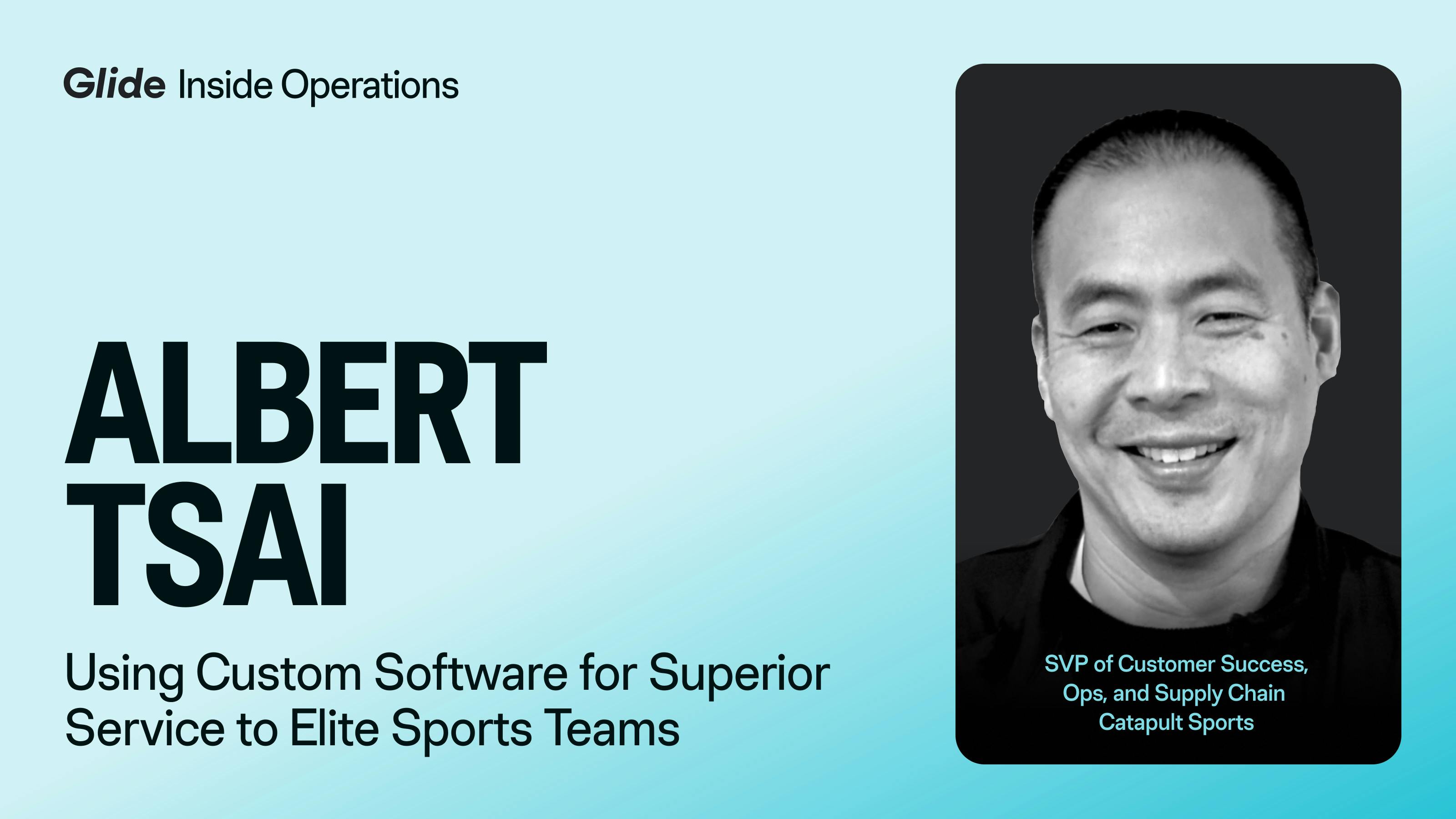We sat down with Albert Tsai to discuss his role managing operations at Catapult Sports and how he uses Glide to manage his team to maintain the highlest level of service.
How would you describe your role at Catapult Sports?
My title is SVP of Customer Success, Operations, and Supply Chain Logistics. The groups I oversee are Operations, which includes Product Support, Customer Success, and Supply Chain and Logistics. While Supply Chain and Logistics may look out of place in this list, we’ve organized them this way because these groups are all part of a customer’s post-sale experience. For example, logistics ensures that any hardware we ship, such as sensors and computers, arrives on time and is ready to use. Our Support team is always at the ready, responding to issues and providing assistance when needed. And our Customer Success team works proactively to ensure that customers continue to get value out of their investment and benefit from new features or workflows. These three groups are together because they all serve some aspect of the customer experience.
Tell us about Catapult Sports.
The company is a B2B SaaS business and has over 400 staff across 24 locations. We work with more than 3,600 teams in 40 sports, including the NFL, MLB, NHL, AFL, and NCAA. We create and provide technology solutions for the world's best sports teams to maintain and develop athletes so they can compete at the highest levels. This means we have multiple product lines aimed at teams and various sports and levels—all designed to ensure that you stay on the field and are as primed to compete as possible, both physically and mentally.
We have two main product lines: sensors that track all the different data points you'd expect in terms of movement, load, and speed. This data can inform a team as to whether they are overworking or not working athletes hard enough, or if they're on plan. Our other product line is focused on analysis and teaching, using video to catalog every play. For example, in American football, we can pull up every play that was run in college football last year, look at third down blitzes, and see how opponents are going to prepare. We then use this data to create opportunities for learning and improvement during practice, and to be ready for game day.
What are some of the teams that use Catapult Sports?
We work with some of the most successful and well-known sports teams across the globe, including customers like my alma mater, the University of Illinois, and the Steelers in Pittsburgh, where I grew up. Internationally, for example, we have customers that compete in the Bundesliga, the English Premier League, and the Australian Football League. We also have a consumer market aimed at high school athletes aspiring to be the next great soccer or football player.
What role does technology play in coordinating them?
For us, technology is everything. So whether it's "Where's my order?", "What are our current inventory levels?", or "What's the status of a support ticket I might have filed?", so much of what our people need is clarity on what's happening with the customer. Everyone always talks about a “360 view” of a customer, and for us, that view comes from data living in Salesforce, Zendesk, and NetSuite. These are three linchpin products that 90% of companies are using in some fashion. The problem is, they don't actually integrate. Now, with Glide, we're able to integrate all these systems, making it easier for agents to access information and provide customers with better service. For example, an agent on the phone with a customer in Zendesk can quickly check the status of their order without having to put the conversation on hold and reach out to somebody else. Before calling on a customer, our Commercial teams can now check to see if they have any open issues, allowing them to better prepare for the call.
As we've scaled, we've expanded the use of Glide to other departments, and it's been amazing to see how people with no traditional coding background have been able to create value for our company. For example, one of our logistics team members built an app to streamline our game day operations, which has received great feedback from the people who used to have to do post-game reports. It's awesome to see how Glide has allowed us to solve problems using data and technology, freeing up people to operate more efficiently.
How do you learn on the job?
Much of what we do has been learned through experience and partnering with our customers. Our industry is unique in that we work with some of the most elite sports organizations in the world. With that comes high expectations. This includes everything from what the organizations expect from their athletes to the partners they choose to work with.
In this industry, traditional nine-to-five business practices often get thrown out the window because games are played outside of office hours. For example, if there is a problem before a game, we may only have 10 minutes to solve it. This sense of urgency means we go above and beyond to ensure our customers have a positive experience. Even a small issue can have a big impact, especially for teams that only play a limited number of games per season.
We are known throughout the industry for our customer support, and it’s a strategic differentiator for our company.
Do you anticipate a shift towards using more technology in the industry?
It's constantly evolving. Our team members travel frequently, and often all they have is their phone. Setting up a computer and hotspotting can be a hassle. Having mobile access is great for this cohort of people. Having access to all the different information in one place is also important. For example, there is a Salesforce phone app and a Zendesk phone app, but cross-checking and relating everything together can be a challenge. Having all the information at your fingertips is really good.
We're using data more for future planning. Before we send people out, we want to know which customers we really want to visit based on factors like client health and new staff that we want to train in person. Pulling all that data into one place creates a single source of truth, which everyone can access. We're all trying to work efficiently and prioritize.
And lastly, we’re always looking for ways to leverage technology to save us time. We want our folks concentrating on high-impact work so if there are opportunities where we can use technology to remove manual touchpoints from a process, surface insights more quickly, etc. we’ll invest in building something like a Glide app in order to give people back time.
What's been one of the hardest parts about scaling your team as the company has grown?
We have a framework of different service levels for different types of customers. For example, when a server went down at an NFL club, a technician drove overnight to fix it before the staff arrived in the morning. Similarly, when customers make it to the Super Bowl, we travel to set up a remote office and ensure everything runs smoothly.
Our customer success team often works as an extension of a team’s staff. We collaborate with sports scientists to ensure customers get the most value out of their data, and we work on performance projects, such as return from injury protocols. We also mentor strength and conditioning coaches to take a more holistic approach to sports science.
While some companies may focus solely on selling more, we prioritize being a partner to our customers. We strive to help them in any way we can, recognizing that they are busy and don't necessarily want to spend all their time on technology.
Is there a way that you teach that incredibly high emphasis on customer service to your team at Catapult Sports?
We have core values that reflect the nature of elite sports. Being a good teammate is the most important value to us. During the fall season, football and soccer overlap and it can be overwhelming. However, everyone on our team supports each other, and we get through it. This is one of the reasons we love hiring former users that have spent time at the highest levels of competitive sport as it allows us to hire people who already possess this value rather than having to teach it.
Any final thoughts, whether it's general career learnings or outlooks on the industry?
Everyone talks about the democratization of data and tech, and it's real. All the stuff I did 25 years ago when I first got my engineering degree, you almost don't even have to go to college anymore. If you understand tech and data, you can start to be self-sufficient, which is super empowering because now you can actually solve problems without relying on others. You end up creating more capacity and solving problems that allow us to create a better experience for our customers.






